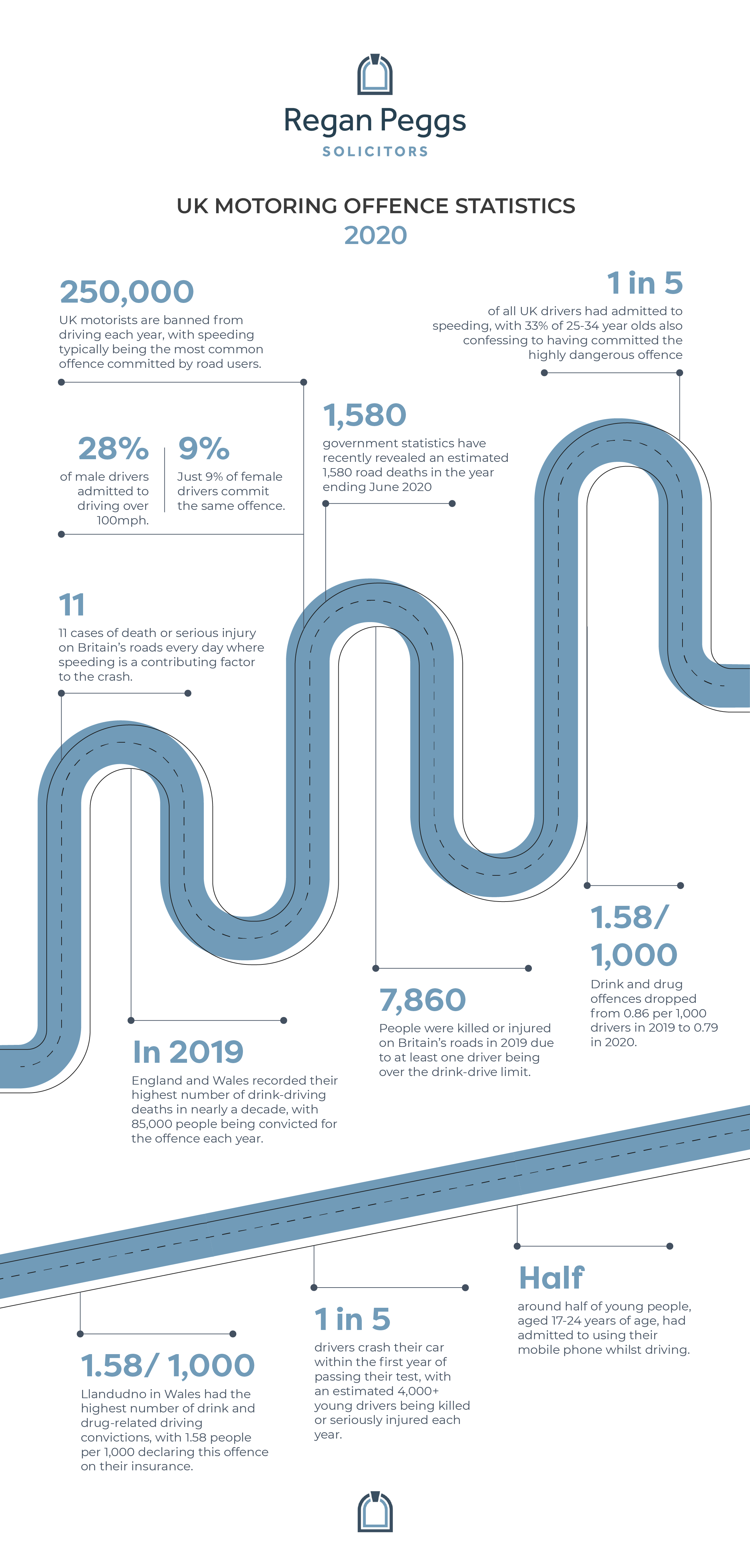As specialists in motoring law, at Regan Peggs, we’ve seen first hand how a potential motoring offence conviction can destroy lives, careers and families.
And you’d expect that one positive of being subject to government lockdown restrictions over the past year would be that traffic accidents and motoring offences should have declined dramatically.
But is that the case?
Discover the latest motoring offence statistics for 2020, including the most common driving offences, the standard of driving from young people and the range of alcohol and drug-related injuries from the past year in our latest blog post.

Most common driving offences
On average, there are 11 cases of death or serious injury on Britain’s roads every day where speeding is a contributing factor to the crash.
250,000 UK motorists are banned from driving each year, with speeding typically being the most common offence committed by road users.
And with a national lockdown in the past 12 months, meaning fewer motorists and less traffic on the roads, that hasn’t stopped speeding motorists from taking advantage of the quieter streets.
In fact, government statistics have recently revealed an estimated 1,580 road deaths in the year ending June 2020, even with three months worth of lockdown included in this period.
Road safety charity, Brake, has made its mission to warn and inform motorists of the devastation that excessive speeding can have on people’s lives and their families.
A recent survey completed by the charity revealed that 28% of male drivers admitted to driving over 100mph.
This figure was three times the volume of women, with just 9% of female drivers committing the same offence.
In fact, the research highlighted that nearly one in five of all UK drivers had admitted to speeding, with 33% of 25-34 year olds also confessing to having committed the highly dangerous offence.
The data also highlighted that Nottinghamshire Police had reported the highest speed recorded during the year of 180mph in a 70mph zone, whilst the Metropolitan Police had recorded 152mph in a 30mph speed limit zone.
It stands in 2021 that any driver caught speeding over 100mph on a public road will face a driving ban, typically up to eight weeks, and a fine equalling 150% of their weekly income.
Alcohol and drug-related offences
Drink driving continues to be a significant problem on Britain’s roads.
In 2019, England and Wales recorded their highest number of drink-driving deaths in nearly a decade, with 85,000 people being convicted for the offence each year.
Sadly, data from road safety charity Brake revealed that an estimated 7,860 people were killed or injured on Britain’s roads in 2019 due to at least one driver being over the drink-drive limit.
Although this is still a dramatically high amount of drivers being convicted, it was recently revealed that drink and drug convictions were down in 2020.
Statistics from insurance comparison site MoneySuperMarket highlighted that drink and drug offences dropped from 0.86 per 1,000 drivers in 2019 to 0.79 in 2020.
The experts have highlighted this was driven by the relevant lockdown measures in 2020, contributing to the decrease, due to the quieter Christmas and New Year period.
In accordance with location, Llandudno in Wales had the highest number of drink and drug-related driving convictions, with 1.58 people per 1,000 declaring this offence on their insurance.
Other areas with a comparably high volume of drink and drug driving convictions to Llandudno include Blackpool, Liverpool, Darlington and Newport.
And it’s not just the police who are concerned about the level of drink and drug-related offences on UK roads; the British Public want tighter restrictions too.
A survey from Insurance Revolution revealed that 30.40% of drivers believe there should be a zero alcohol limit to drive in the UK.
Young people and road traffic offences
Young, ill-experienced drivers pose a significant hazard on British roads.
According to Brake, 1 in 5 drivers crash their car within the first year of passing their test, with an estimated 4,000+ young drivers being killed or seriously injured each year.
From ‘impressing’ friends with their speeding to using mobile phones at the wheel, younger drivers’ inexperience has meant they are more likely to be involved in a road traffic accident.
The RAC recently revealed that around half of young people, aged 17-24 years of age, had admitted to using their mobile phone whilst driving. Paired with weak hazard perception behind the wheel, this is often a recipe for disaster.
For young drivers who face a motoring offence, if they accumulate six or more points within two years of passing their driving test, their license will be revoked.
Are you shocked about the statistics surrounding motoring offences in the past year?
Well, be sure to download and share our latest infographic surrounding UK motoring offence statistics for 2020 with motorists to allow them to stay informed about Britain’s roads.
If you find yourself in a situation where you are facing a motoring offence of any kind and would like advice from a member of the Regan Peggs team, please get in touch with us by phone on 0121 201 3765 or send us an email at info@reganpeggs.com to discuss your situation in more detail.
- UK Motoring Offence Stats: A Closer Look at the Numbers - October 26, 2023
- Are Sat Navs Excuses for Motoring Offences? - October 4, 2023
- Is divorce always 50/50? - August 2, 2023

